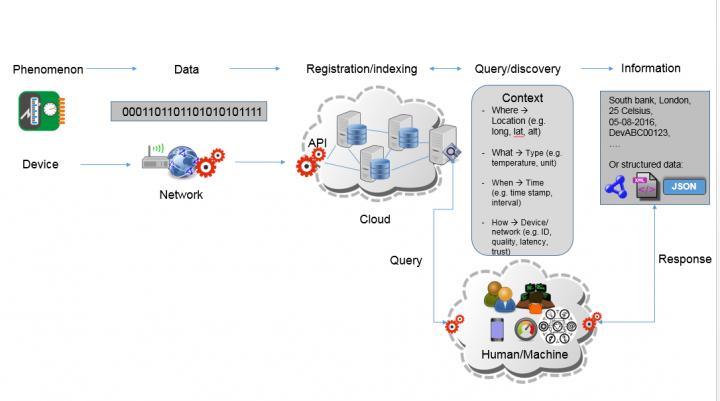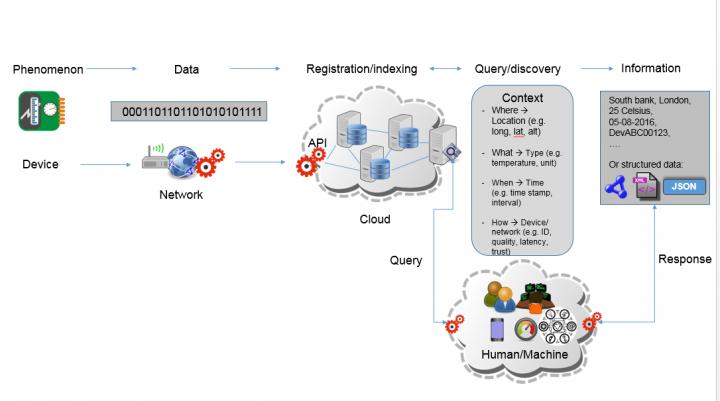
Credit: University of Surrey
- Experts in next generation communications outline how internet search mechanisms will need to change to support the Internet of Things (IoT) whereby billions of devices will become connected
- Complex future technologies such as smart cities, autonomous cars and environmental monitoring will demand machine-to-machine searches that are automatically generated depending on location, preferences and local information
- New requirements will include being able to access numerical and sensory data, and providing secure ways of accessing data without exposing the devices to hackers
- An article highlighting the latest research in this area by academics at the University of Surrey and Wright State University (USA) has been published in IEEE Intelligent Systems
A recent article published in IEEE Intelligent Systems highlights the requirements the IoT will place on search engines and brings together the latest research being carried out in this field. 'On Searching the Internet of Things: Requirements and Challenges' has been written by leading researchers working in the field of next generation communications at the University of Surrey's Institute of Communication Systems (home of the 5G Innovation Centre) and Ohio Center of Excellence in Knowledge Enabled Computing (Kno.e.sis) at Wright State University (USA).
With more and more IoT devices being connected to the internet, and smart city data projects starting to be implemented, there is an urgent need to develop new search solutions which will allow information from IoT sources to be found and extracted. While existing search engines have ever more sophisticated and effective ways of crawling through web pages and searching for textual data, the article argues that they will not be effective in accessing the type of numerical and sensory data which IoT devices will need to gather.
The article states that whereas in the past, human users have searched for information on the web, the IoT will see more machine-to-machine searches which are automatically generated depending on location, preferences and local information. Autonomous vehicles, for example, will need to automatically collect data (such as traffic and weather information) from various sources without a user being involved.
The IoT also presents a challenge in terms of cyber security. Applications which rely on public data, such as smart city technologies, need to be very accessible to make them available to a wide range of applications and services. Search mechanisms for these devices will need to provide efficient methods of indexing, crawling and finding data while ensuring the data is safe from hackers.
The University of Surrey's 5G Innovation Centre – the UK's largest hub for research into next generation communications- is conducting a number of projects in the field of IoT search engines. These include developing search mechanisms that describe the sources of the data required, and developing algorithms for clustering and analysis of IoT 'time-series' data.
The article's lead author Dr Payam Barnaghi (a Reader in Machine Intelligence at the University of Surrey), says: "Search engines have come a long way since their original purpose of locating documents, but they still lack the connection between social, physical and cyber data which will be needed in the IoT era. IoT data retrieval will require efficient and scalable indexing and ranking mechanisms, and also integration between the services provided by smart devices and data discovery.
"IoT technologies such as autonomous cars, smart cities and environmental monitoring could have a very positive impact on millions of lives. Our goal is to consider the many complex requirements and develop solutions which will enable these exciting new technologies."
The article's second author, Professor Amit Sheth of Kno.e.sis, comments: "I see tremendous opportunities to effectively utilize physical (especially IoT), cyber and social data by improving the abilities of machines to convert diverse data into meaningful abstractions that matter to human experiences and decision making. IoT search, particularly for devices or machines to interact with each other to find and aggregate relevant information on a human's behalf, will become a critical enabler."
'On Searching the Internet of Things: Requirements and Challenges' was published in IEEE Intelligent Systems.
###
Media Contact
Ashley Lovell
[email protected]
44-148-368-6141
@UniOfSurrey
http://www.surrey.ac.uk
############
Story Source: Materials provided by Scienmag





